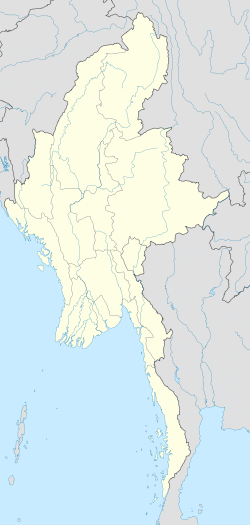Maungdaw
Town in Rakhine State, Myanmar From Wikipedia, the free encyclopedia
Maungdaw (Burmese: မောင်တောမြို့; MLCTS: maung:tau mrui., pronounced [máʊɰ̃dɔ́ mjo̰], Bengali: মংডু, romanized: Moṅḍu) is a town in Rakhine State, in the western part of Myanmar (Burma). It is the administrative seat of Maungdaw Township and Maungdaw District. Bordering Bangladesh, Maungdaw is home to one of 2 official border trade posts with Bangladesh. This post is callled Maungdaw Port.
Maungdaw
မောင်တောမြို့ | |
|---|---|
Town | |
 A street in Maungdaw | |
| Coordinates: 20°49′N 92°22′E | |
| Country | Myanmar |
| Division | Rakhine State |
| District | Maungdaw District |
| Township | Maungdaw Township |
| Area | |
• Total | 582.92 sq mi (1,509.8 km2) |
| Elevation | 10 ft (3 m) |
| Population (2008)[1] | |
| • Ethnicities | 80% Rohingya |
| • Religions | Buddhism Islam Christianity Hinduism |
| Time zone | UTC+6:30 (MMT) |
| Climate | Am |
Maungdaw is 16 miles (26 km) west of Buthidaung. The two towns are separated by the Mayu Mountains and are connected by two tunnels built in 1918. The district around Maungdaw is home to a large Rohingya population.

History
In August 2024, the civilians trying to flee the town from violence related to the Myanmar civil war were attacked in an artillery and drone attack.[2][3] The victims were predominantly Rohingya, trying to flee fierce fighting in Maungdaw by crossing the Naf River into Bangladesh. The number killed by the strike may have been between 150 or 200, with possibly 300 more injured.[2][3] A number of local Rohingya activists blamed the Arakan Army for the strike,[2][3] which the group denied, and blamed the government for.[3]
On 8 December 2024, the Arakan Army took complete control of Maungdaw and the Bangladesh–Myanmar border after a prolonged 6 months battle in Maungdaw.[4]
Demographics
The majority of the populace, about 80%, are Rohingya people, while the remainder of the populace consists of other ethnic groups, including Rakhine, Bamar, Daingnet, and Mro.[citation needed]
Education
As of 2016, there are eight high schools, 10 middle schools, 16 post-primary schools and 125 primary schools.[5]
Economy
The official border trade post with Bangladeshi town of Teknaf opened on 5 September 1995.[6] In 2022, total trade volume at the border post stood at US$15.519 million.[7]
References
External links
Wikiwand - on
Seamless Wikipedia browsing. On steroids.

